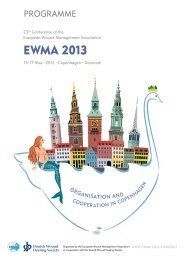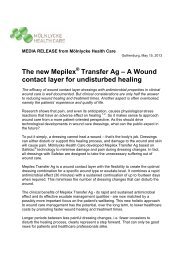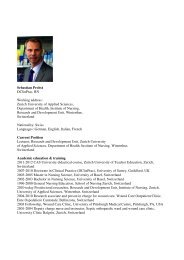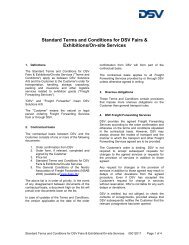Create successful ePaper yourself
Turn your PDF publications into a flip-book with our unique Google optimized e-Paper software.
KEY SESSION: NUTRITION IN WOUND CARE<br />
Key Session: Nutrition in Wound Care<br />
103<br />
Nutrition treatment and wound healing<br />
Lubos Sobotka 1<br />
1 Charles University in Prague, Medial Faculty – University Hospital (Prague, Czech<br />
Republic)<br />
The strong increase in cell proliferation, protein synthesis, and enzyme activity during<br />
the wound healing process requires local accumulation of energy and building<br />
substrates. In general amino acids are released from body protein stores, whereas<br />
glucose is produced in the liver. Glucose oxidation is low during the early period of<br />
wound healing probably due to glucose flux to synthetic pathways like the pentose cycle.<br />
Undernourished subjects are at risk of delayed wound healing. When undernutrition is<br />
associated with systemic inflammation the wound healing may be almost blocked. High<br />
protein supplements have been shown to reduce the incidence of pressure ulcers.<br />
Assessment of nutritional status and monitoring of food intake should be an essential<br />
part of the care of patients with wounds. Nutrition intake must always cover daily<br />
requirement of energy (30 to 35 kcal•kg-1) and protein (1 to 1.5 g•kg-1). In already<br />
malnourished patients or in the presence of non-healing wounds the daily energy and<br />
protein intake should be increased to 35-40 kcal•kg-1 and 1.5-2.0 g•kg-1, respectively.<br />
Frequently, such intake cannot be provided in a standard diet and nutritional<br />
supplements must be given. They should be as specific as possible to a patient’s<br />
nutritional deficiency. Protein, micronutrients, and vitamins as well as substrates that are<br />
turned over rapidly (e.g., arginine) should be included. A specific energy and protein<br />
enriched supplement, containing elevated amounts of arginine, zinc, vitamin C and<br />
antioxidants accelerated healing of pressure ulcers in a recent double blind, prospective,<br />
randomised study.<br />
Reference<br />
van Anholt RD, Sobotka L, Meijer EP, Heyman H, Groen HW, Topinková E, van Leen M, Schols JM. Specific<br />
nutritional support accelerates pressure ulcer healing and reduces wound care intensity in non-malnourished<br />
patients. Nutrition. 2010;26:867-72<br />
104<br />
Specific nutritional support:<br />
nutraceutics and molecular mechanisms<br />
Key Session: Nutrition in Wound Care<br />
Miriam Theila 1<br />
1 ICU (Israel)<br />
A wound is a disruption of the integrity and continuity of epithelial surfaces and their<br />
underlying tissues. Several mechanisms of injury may be involved in wound formation,<br />
including mechanical (pressure, and/or shear), thermal or chemical (burns) forces, or<br />
infection. Wound healing is the complex, multi-stage response to tissue injury. This<br />
physiologic repair response requires a dynamic temporal and spatial interplay of several<br />
cell types, including local parenchymal and mesenchymal cells as well as resident and<br />
recruited inflammatory cells. This is a dynamic and highly regulated process of cellular,<br />
humoral and molecular mechanisms which begins directly after wounding and might last<br />
for years<br />
The healing of wounds is of relevance to clinical nutrition. The EUPAP endorses the<br />
delivery of at least 30-35 kcal/kg/day and 1.25 to 1.5 grams protein/kg body to patients<br />
with, or at risk of developing PU(s) and to adjust the nutrition prescription according to<br />
the individual patient’s overall condition. The Panel considers the role of zinc, arginine,<br />
Vitamin C and A that are essential for wound healing. Some evidence suggests that a<br />
combination of enriched nutritional formulas which include calories, protein,<br />
micronutrients and omega-3-polyunsaturated fatty acids may have a role to play in the<br />
prevention of new ulcers and healing of existing ulcers. The specific role of omega-3<br />
fatty acids has been described recently through a modulation of expression of adhesion<br />
molecules. Additional studies are required before clear recommendations may be made.<br />
<strong>EWMA</strong> <strong>2013</strong><br />
COPENHAGEN<br />
15-17 May · <strong>2013</strong><br />
Danish Wound<br />
Healing Society<br />
71






